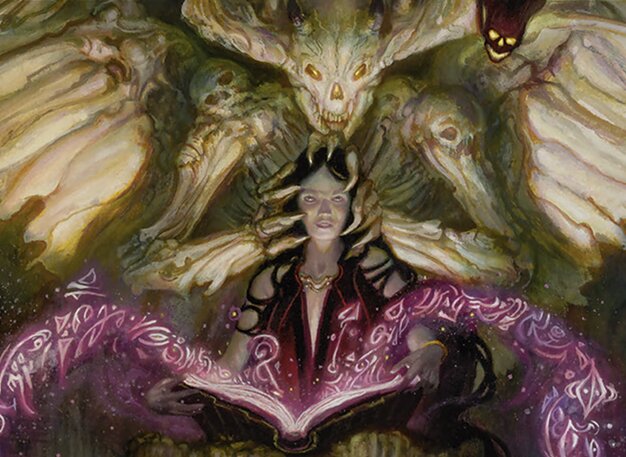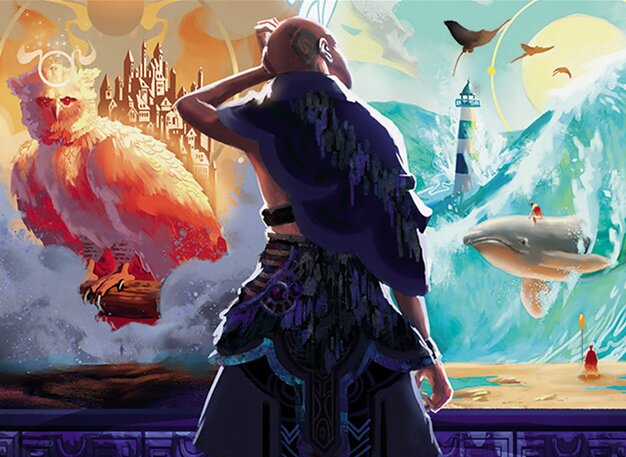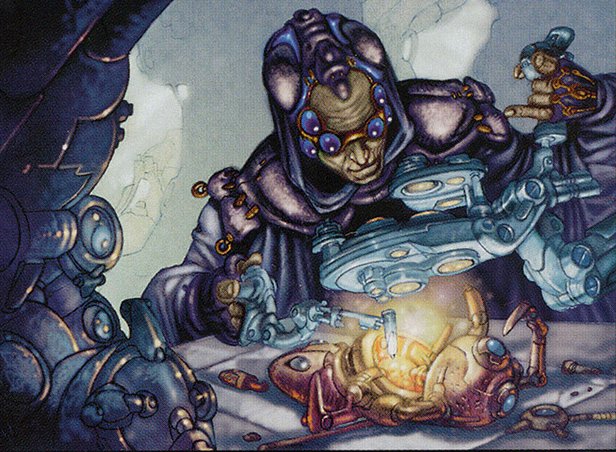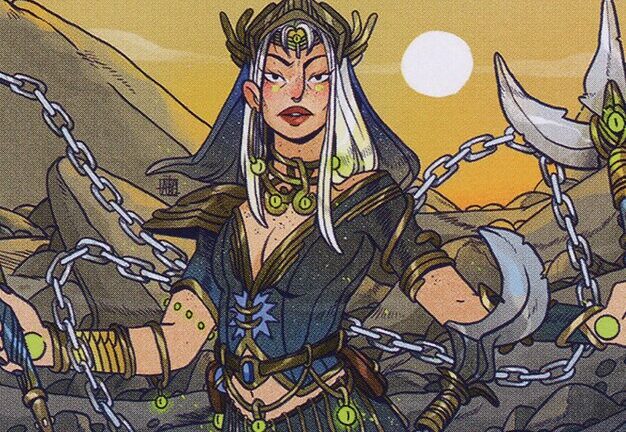Brew like a Game Designer: Fixing the Tutor Problem (A Defense of Toolbox Decks)
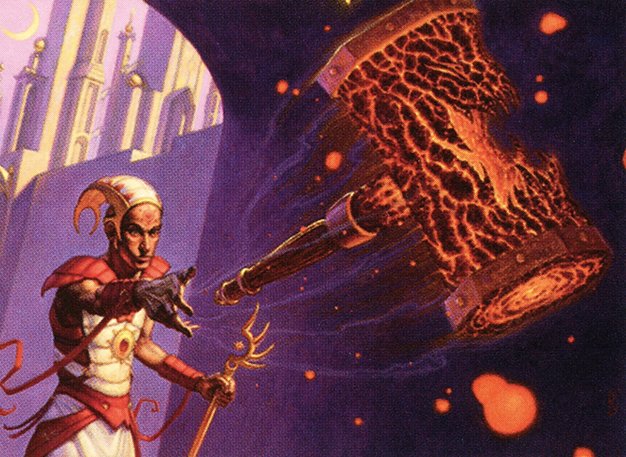
(Sunforger | Art by Darrell Riche)
A.K.A. "Kieran Gets to Talk About Sunforger"
Here are a few true things:
- This series (and my personal deckbuilding philosophy) emphasizes making Commander decks as fun as possible to play and play against.
- The popular consensus among Magic content creators is that tutors (effects that search your deck for cards of your choice, like Demonic Tutoror Green Sun's Zenith) often make Commander decks less fun to play. I mostly agree.
- I love building and playing toolbox decks, which are centered around tutor effects. My favorite thing in the game is tutoring for a tutor.
Let's spend a little time unpicking this contradiction and maybe learn a bit about the role of tutor cards in Commander along the way. Shall we?
A History of Tutors
"Tutor" is Magic: The Gathering vernacular for an effect that can search your library for another specific card, or for the act of doing so (as in, "I tutored for Kiki-Jiki
- Enlightened Tutor
- Mystical Tutorand Personal Tutor
- Vampiric Tutorand Imperial Seal
- Gamble
- Worldly Tutorand Sylvan Tutor
Since this time, Magic's designers have refined the game's mechanics, further defining what cards each color is broadly capable of tutoring for in. In the modern color pie:
- White can tutor for enchantments, as well as smallcreatures, Equipment, and Vehicles.
- Blue can tutor for artifacts, as well as instants and sorceries.
- Black can tutor for any card, often at a cost, and is also uniquely capable of tutoring to the graveyard.
- rarely tutors, though occasionally it can tutor for artifacts. Sometimes red can tutor for cards outside its assigned purview, but doing so involves significant risk.
- can tutor for creatures and lands.
Colors can also tutor for subsets of their available categories. For instance:
- White, able to tutor for enchantments, can also tutor for Auras.
- Blue, able to tutor for artifacts, can also tutor for Equipment and Vehicles or artifacts with specific mana values.
- Green, able to tutor for creatures, can also tutor for creatures with specific abilities.
Additionally, every color can occasionally tutor for categories of cards that feel essential to that color. For instance, Red can tutor for Dragons and Goblins.
One category I've deliberately left off this list is cards that tutor exclusively for basic lands. These cards, while technically tutors, serve a very different purpose in deckbuilding. Rather than finding you cool cards to play, they just ensure that you have the mana to play your cards (also important!).
This is by no means an exhaustive list; the color pie is complex and full of exceptions. However, understanding the basic types of tutors available in each color will help us find the most fun way to use this type of card in our decks.
(Demonic Tutor | Art by Donato Giancola)
The Problem with Tutors: Options vs. Choices
The primary criticism of tutors in Commander goes as follows: by ensuring that you can always access your best cards, tutors reduce the diversity of the games you play. Commander is a 100-card singleton format because drawing different cards every game leads to fun, varied gameplay experiences. Tutors can homogenize the games you play until they all kinda feel the same.
For instance, suppose you play Craterhoof Behemoth in your Lathril, Blade of the Elves deck. You'll probably draw the Hoof in maybe 1/3 of your games, and it'll end many of them. However, the majority of your games will end in other ways (Poison-Tip Archer maybe, or Elvish Champion).
Now, what if you also put Demonic Tutor, Vampiric Tutor, and Worldly Tutor into your deck? Suddenly you'll have access to Craterhoof Behemoth in the vast majority of your games. If you want, almost every game can end in a Hoof-induced stampede. And, strategically, almost every game probably should, because Craterhoof Behemoth is an incredibly effective way to win a game. Soon, your old friends Poison-Tip Archer and Elvish Champion might sit sadly on the sidelines, no longer relevant to the deck's Hoof-centric game plan. So, the addition of tutors to our Lathril deck made the deck stronger, but also made it a less varied, interesting, and fun deck to play. What gives?
Mark Rosewater, Magic's lead designer, drew a distinction between options and choices in his 2009 article "Decisions, Decisions."
Options, Rosewater proposes, are "additive decisions. That is, they are choices that give the player an additional ability that does not come into conflict with previous abilities." For instance, Demonic Tutor provides players with an enormous range of options: access to any card in their deck, on demand.
A plethora of options, however, does not always lead to fun gameplay. To steal another hypothetical from Rosewater, imagine if every card in Magic had flash. Technically, this gives players many more options regarding when to cast their spells. However, in practice, there's actually only one correct answer in this hypothetical situation: always hold your spells until the last possible moment, which is usually the end of an opponent's turn. No longer do players need to decide between casting a threat, wiping the board, and leaving mana open for a Counterspell. Instead, they can wait until the right decision becomes obvious, then act accordingly. In this example, a surplus of options has actually lowered the interesting strategic complexity of our favorite game.
Similarly, adding a card like Demonic Tutor to your Lathril deck can increase the options available while reducing your actual decisions. If the right decision is usually to go find your Craterhoof Behemoth, then you've actually removed some strategic depth from your deck. No longer will you need to ask yourself questions like "How can I leverage Poison-Tip Archer to win the game?" or "Should I try to protect myself or draw cards to dig towards a win condition?" Instead, the only relevant question when you draw Demonic Tutor is "What card do I want most right now?" which isn't as fun or interesting a question to answer. This is why tutors often draw valid criticism from the Commander community: they provide powerful options while simultaneously reducing the fun variability and strategic complexity of Commander games.
Rosewater describes choices, on the other hand, as "[I]nteractive decisions... That is, they are decisions that impact the use of other abilities in the game. Yes, you gain new functions, but at the cost of old functions." In practice, this means that choices require sacrifice of some sort. Maybe you can play a threat, but you give up the ability hold mana open and cast a Counterspell later. Or maybe you can find a Beast Whisperer with your Birthing Pod, but you'll need to sacrifice your Elvish Archdruid. In short, choices are decisions with consequences. Finding the right choice to make in these circumstances is engaging, challenging, and much more interesting than deciding which card to get with Demonic Tutor.
So, how do we use tutors to increase the number of interesting choices we make when playing our decks, without giving ourselves so many options that we make the game less fun?
Tutors With Consequences
In short, we want the tutors we play to ask interesting questions of us other than "what's the best possible card I could draw right now?" I'm going to show you how to accomplish this goal by focusing on three of my favorite cards in the whole game. These are, in no particular order:
Take a moment to familiarize yourself with these cards if you aren't a Scryfall-dwelling cryptid like myself, then let's dive in!
(Fact or Fiction | Art by Mateus Manhanini)
Tutors and Gameplay Choices
All three of the cards listed ask you to make significant sacrifices in order to use their powerful tutoring abilities.
Artificer's Intuition asks you to discard an artifact to use it, and the artifact you're finding needs to cost 1 mana or less. In practice, this means that Artificer's Intuition often asks you to consider whether a low-power card of your choice is worth losing access to a high-power card. For instance, Artificer's Intuition might ask you if you'd discard:
- Solemn Simulacrum for Relic of Progenitus to exile a bloated graveyard?
- Lightning Greaves for Great Furnace to hit a missing land drop?
- Vanquisher's Banner for Esper Sentinel?
- Worn Powerstone for Sol Ring?
Other than that last one, these are all nuanced questions that I believe contribute to interesting strategic gameplay.
Similarly, Wild Research asks if finding an instant or enchantment of your choice is worth potentially losing access to any card in your hand. Is even the best card in your deck worth the risk of discarding the removal spell you're counting on? What about the risk of spending two mana only to put the card you need directly into your graveyard? Lots more questions here than merely "what card should I get?"
The choices and risks inherent to Sunforger are a little more subtle, but allow me to explain. In a well-built Sunforger deck, Sunforger is capable of doing almost anything, from countering a spell to protecting your board to preventing a lethal attack. That's a lot of options, but few choices.
The choices arise from the fact that Sunforger can only be equipped at sorcery speed, so it can generally only be activated defensively once per turn cycle. When playing Sunforger, the most interesting choices aren't what to tutor for, but when to tutor. Should you get Swords to Plowshares to remove one opponent's Consecrated Sphinx now, or should you save your Sunforger to find Comeuppance if another opponent attacks you? Is either play even worthwhile if it leaves your precious Sunforger open to removal? Will my Sunforger ever love me back? The cost of using Sunforger is often that you'll have your shields down until the start of your next turn, and all your opponents will know it.
As a whole, this suggest that the most fun tutors are those that create interesting choices by involving some sort of risk or sacrifice.
(As an aside, Birthing Pod wishes it fell into this category. The ability to exchange one creature for another has so much potential to be super fun, and I've tried to build a Pod deck multiple times. In practice, though, Pod tends to either ignore its own downside by sacrificing creatures that want to die, or else end the game immediately with a combo kill.)
(Trinket Mage | Art by Mark A. Nelson}
Tutors and Deckbuilding Choices
Choices don't only exist during gameplay, though. The most fun tutors also ask players to make fun choices during the deckbuilding process.
You'll notice that Artificer's Intuition and Sunforger both have severe restrictions on what they can tutor for. "Artifacts with mana value 1 or less" and "red and white instants with mana value 4 or less" are both very narrow categories. And this is great.
By restricting the cards they can find, these two tutors encourage deckbuilders to make unconventional card choices. I don't think I'd play Strength-Testing Hammer if I wasn't playing Artificer's Intuition, or Olórin's Searing Light if I wasn't playing Sunforger. These tutors turn cards that were always technically options into cards that are actually valid choices for your deck.
This sort of "repeatable tutor with a restriction" often stars in toolbox decks. The "toolbox" archetype encompasses decks that center around a repeatable tutor and a wide range of cards for the tutor to find. Usually, a toolbox deck incorporates many situational effects that can be tutored up when they'll be most effective. A toolbox might include effects like:
- Removal for each card type
- Board protection
- Counterspells
- Card draw/ramp
- Graveyard hate
- Stax effects like Vexing Bauble or Propaganda
- Recursion
- Win conditions
Usually, a toolbox deck wants to play as many different types of effects as possible. The power of this sort of deck is not in the strength of individual cards, but in the ability to always have access to the right tool for a given situation. A toolbox deck's ultimate goal is to never face a problem it can't solve or a threat it can't answer.
Building a well-crafted toolbox deck demands many choices during deckbuilding. For instance, a deckbuilder crafting a Sunforger deck might be confronted with the following questions:
- How many removal spells for each card type should I put in my toolbox? How many counterspells? How much board protection?
- Regarding removal, do I care more about efficiency, flexibility, or value? What about the potential to get around abilities like hexproof and indestructible or effects like graveyard recursion?
- Is Settle the Wreckage or Comeuppance a better answer for a large attack? Do I have space to play both? Am I fine with just a Teferi's Protection?
- Can one card fill multiple roles in my toolbox?
There are no right answers to these questions, no "best in slot" cards. The right choices for your toolbox depend on your playgroup, deck, and personal preferences.
Compare this to Demonic Tutor. Demonic Tutor is powerful in almost every deck that can play it, but it creates no interesting choices when deckbuilding. In fact, unconditional tutors like this can actually limit choices during deckbuilding. If you know you can always find your Craterhoof Behemoth, you won't need to choose which other win conditions to put in your deck.
From this, we can deduce that the most fun tutors provoke unconventional deckbuilding choices due to tight restrictions on which cards they can find.
(Lin Sivvi, Defiant Hero | Art by AlbaBG}
Tutor Chains and Tutor Loops
"But Kieran," I hear you say. "I don't want to feel limited when I play my tutors! I love feeling like I have every card in my deck at my fingertips! They're such cool cards, Kieran!"
Fear not, friend: I feel the same way. And the solution is more tutors! Allow me to introduce the concept that's driven over a dozen of my toolbox decks over the last decade: tutor chains!
Here's where this article really goes off the rails.
A question: can Recruiter of the Guard tutor for Sunforger? Well, no, but also... yes? By including Stoneforge Mystic in a deck with Recruiter of the Guard and Sunforger, you can bridge the gap between them, creating a sort of "tutor chain" that allows Recruiter to find Sunforger.
Playing conditional tutors that chain into each other expands your choices when tutoring, but applying an additional cost to those choices keeps them interesting and prevents you from always tutoring for the same card. In the above example, Recruiter of the Guard can find a small creature for or an Equipment for . So you'll still have access to Sunforger, but tutoring for the Hammer is now a strategic choice, not an obvious option.
By adding a Sunforgerable creature tutor, like Eladamri's Call or Congregation at Dawn, you can even enable Sunforger to find Recruiter, creating a closed loop of raw tutoring potential! This means that, given enough time and mana, any of these four tutors can find:
- Any creature
- Any Sunforger-able instant
- Any Equipment
Nothing better than paying 13 mana in installments ( + + + + ) to search out any creature with Recruiter of the Guard! That's inevitability, right?
It may seem like a tutor loop creates a boring, prescribed path for your deck, but with thoughtful card choices, a deck's tutor loop can be a dynamic engine that changes based on circumstance. For instance, if you're using Stoneforge Mystic to find Sunforger and you've got some time to breathe, why not grab Sword of Hearth and Home on the way, then blink the Mystic to keep the loop going? How about playing Trophy Mage as redundancy for Stoneforge Mystic, thus allowing yourself to access artifacts with mana value 3 from your tutor loop? That's choices, baby!
This core tutor loop powers a Commander deck I've owned for eight years, in which the full tutor chain looks like this:
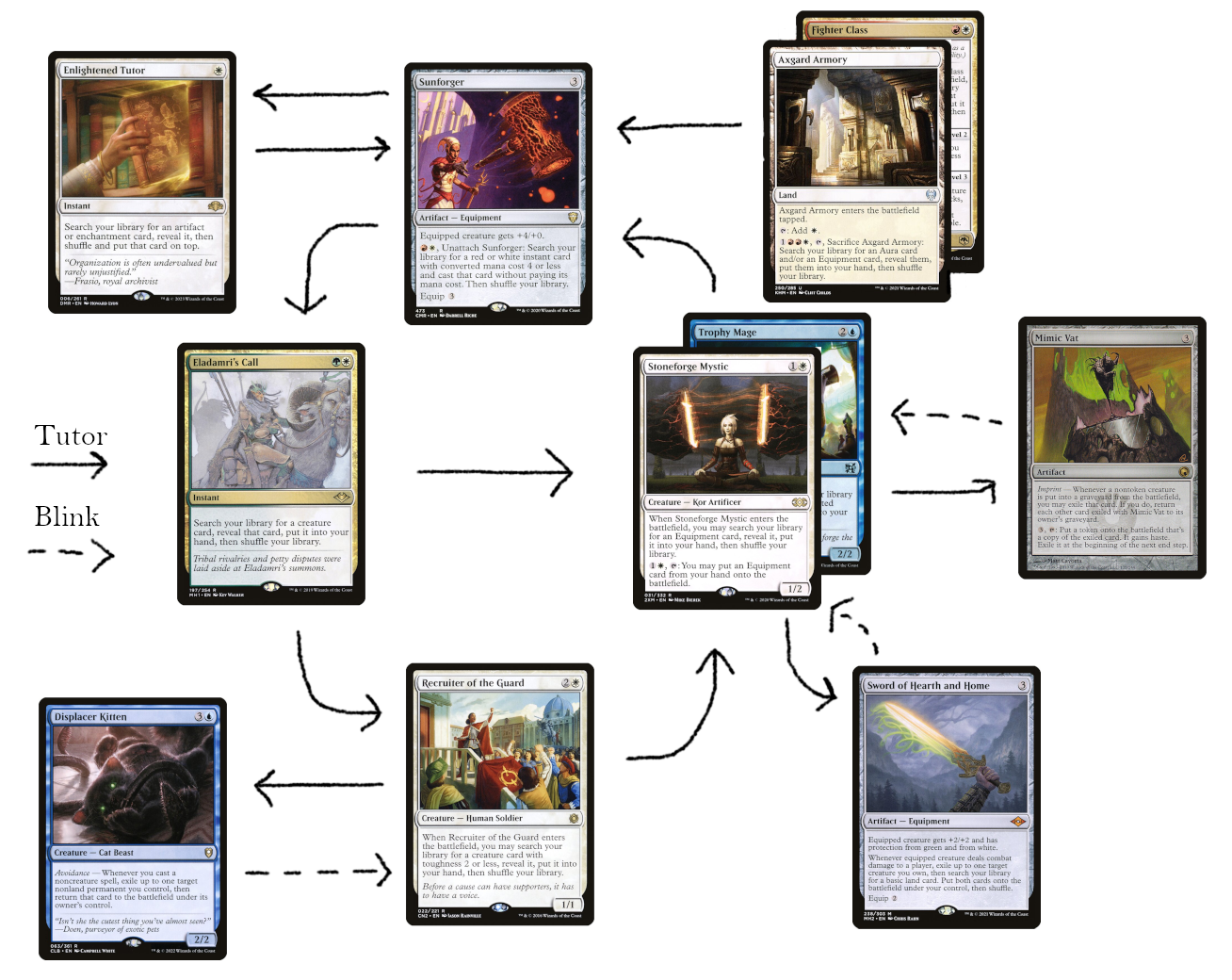
(Plus Eternal Witness, Naya Charm, and other recursion as redundancy for cards in the graveyard.)
There's a ton of choices in here! If we draw Recruiter of the Guard, do we find a good small creature, or do we try to ride the tutor chain all the way to Sunforger? Do we have time to pick up Displacer Kitten or Sword of Hearth and Home along the way? When do we spend our single Enlightened Tutor or Eladamri's Call to get something outside of the tutor loop? That's a lot more choice than Demonic Tutor offers, even if Demonic Tutor gives you more options.
In short, chaining restrictive tutors together allows you to access most of your deck with any tutor, but at an additional cost of time and mana. This creates nuanced strategic choices during gameplay and also encourages innovative deckbuilding.
Tutor chains are also a LOT of fun. I've been tinkering with my deck that incorporates the above loop for 8+ years and it's my favorite deck of all time. Was this article just an excuse to show it off? Maybe!
Meltiest Bros.
View on ArchidektCommander (1)
Creatures (25)
- 1 Aerial Extortionist
- 1 Bloom Tender
- 1 Displacer Kitten
- 1 Eight-and-a-Half-Tails
- 1 Emiel the Blessed
- 1 Emrakul, the Promised End
- 1 Eternal Witness
- 1 Generous Patron
- 1 Glen Elendra Archmage
- 1 High Fae Trickster
- 1 Humble Defector
- 1 Loaming Shaman
- 1 Loran of the Third Path
- 1 Mindclaw Shaman
- 1 Radiant Performer
- 1 Recruiter of the Guard
- 1 Resolute Archangel
- 1 Sakura-Tribe Elder
- 1 Stoneforge Mystic
- 1 Sun Titan
- 1 Trophy Mage
- 1 Wildfire Devils
- 1 Windshaper Planetar
- 1 Zacama, Primal Calamity
- 1 Zirda, the Dawnwaker
Artifacts (8)
Enchantments (4)
Instants (21)
- 1 Akroma's Will
- 1 Call the Coppercoats
- 1 Comeuppance
- 1 Cosmic Intervention
- 1 Eladamri's Call
- 1 Endless Detour
- 1 Enlightened Tutor
- 1 Final Showdown
- 1 Flick a Coin
- 1 Invert Polarity
- 1 Legion Leadership // Legion Stronghold
- 1 Mages' Contest
- 1 Mystic Reflection
- 1 Naya Charm
- 1 Olórin's Searing Light
- 1 Render Silent
- 1 Scout's Warning
- 1 Take the Bait
- 1 Unexplained Absence
- 1 Valakut Awakening // Valakut Stoneforge
- 1 Wild Ricochet
Sorceries (5)
Lands (36)
- 1 Axgard Armory
- 1 Boseiju, Who Endures
- 1 Branchloft Pathway // Boulderloft Pathway
- 1 Breeding Pool
- 1 City of Brass
- 1 Command Tower
- 1 Exotic Orchard
- 1 Fabled Passage
- 1 Flooded Strand
- 2 Forest
- 2 Island
- 1 Jetmir's Garden
- 1 Ketria Triome
- 1 Mana Confluence
- 1 Mistveil Plains
- 1 Misty Rainforest
- 2 Mountain
- 1 Mystic Monastery
- 1 Needle Spires
- 1 Needleverge Pathway // Pillarverge Pathway
- 1 Path of Ancestry
- 3 Plains
- 1 Prismatic Vista
- 1 Rejuvenating Springs
- 1 Spara's Headquarters
- 1 Spire Garden
- 1 Stomping Ground
- 1 Sungrass Prairie
- 1 Temple Garden
- 1 Windswept Heath
- 1 Wooded Foothills
Worse Cards, Better Games
Honestly, that's the thesis of this whole article series, right? That it's better to play fun cards than strong cards. Ditch your Demonic Tutor, y'all. Build a deck around a weird toolbox card. Force yourself to make hard choices. Join me in the murky swamp of tutor chains; the water's warm!
